

|
[ . . . of 1998 | . . . of 1997 | . . . of 1996 ]
A list of enduring favorites |
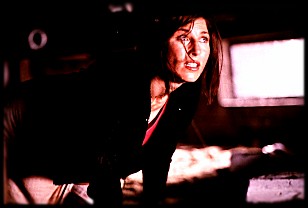 Being John Malkovich (USA Films)
Being John Malkovich (USA Films)After a long run of inventive music videos that proved mainly how in love he was with his own worldview, madcap director Spike Jonze stretched his trademark lunacy to feature length in a debut that showed he's as smart as he is brash. Throughout this boldly metaphorical tour de force, Jonze resists the urge to go for gaudy comedy, instead crafting a deft psychological farce with deeply troubling overtones -- an existentialist black comedy for the turn of the century. |
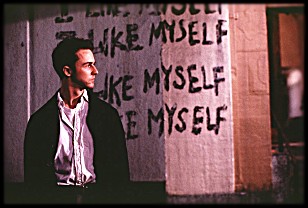 Fight Club
Fight Club(Fox 2000) The most inexplicable major studio release since Mars Attacks! gave director David Fincher license to blow up a plane (photographed from inside the plane, natch), to fit Meat Loaf with pendulous prosthetic breasts, and to direct Edward Norton beating the hell out of himself as Brad Pitt disappears in a puff of testosterone and the flash of a synapse. (That Fox ponied up money to shoot Chuck Paluhniak's seemingly unfilmable novel is testimony, I guess, to Hollywood's faith in star power.) Yes, there are fundamental problems with the material, though this film's thought processes are authentically fuzzy -- like those of the generation it claims to address (and I count myself among them, so this is not a dis). But when it's working, it's penetrating and exhilarating in a way that few 1999 releases managed. An internal epic of rage, confusion, helplessness, and wish fulfillment. |
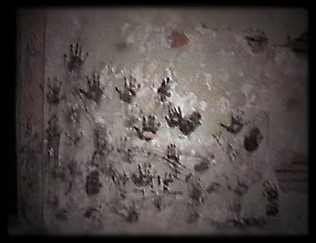 The Blair Witch Project
The Blair Witch Project(Artisan) After driving U.S. ticket sales into blockbuster territory, the hype gave way to Blair Witch backlash, and even if we don't see a fashionable resurgence of cheapie filmmaking as Sundance goes digital next year, the recent inking of deals for two sequels ensures that we'll be dealing with Blair Witch knock-offs for some time to come. If it were possible to clear all that from the air, TBWP might get its own identity back. The apparent artlessness of the film's creation belies its status as a conceptual tour de force -- a headlong exercise in sheer immediacy that aspires to nothing less than a breakdown of the barriers between character and spectator, luring audiences into a participatory relationship with the psychological meltdown pictured on-screen. The final sequence is scary partly because it's a set-up, but also because it achieves a terrifying discontinuity between sound and image, pulling viewers into the breach. The final, haunting image is the hammer that drives the nail in. This is powerful stuff, and more profound than it first appears. |
Stanley Kubrick's last movie was one of the more widely misunderstood of the year, and I'm not sure if that was because expectations were too high or too low (at this point in film history, Kubrick may have looked too much like a cinematic sacred cow). Literalist criticisms -- "the orgy was silly" or "New York City doesn't look like that" -- miss the point. As the title and dreamlike atmosphere suggest, Eyes Wide Shut is a walk through the interior of a mind, a romance (from Kubrick! A romance!) that takes place on a phantasmal landscape that's both elevated and corrupted by the auteur's stifling perfectionism. The Perfect Vision editor Harry Pearson told me he considered it a horror film, which puts another spin on Kubrick's distinctly asexual consideration of sexual jealousy. It's a severely flawed film, and one that would have benefited from keener cutting in its final real. Still, its effects linger -- some years from now, removed from an unfriendly cultural context that reveres a pleasant trifle like American Beauty as some sort of haunting masterpiece, the critical establishment may well decide that it approaches greatness.
|
 The Talented Mr. Ripley
The Talented Mr. Ripley(Paramount/Miramax) Anthony Minghella goes for broke, channeling the spirit of Alfred Hitchcock through a brilliant novel by Patricia Highsmith (whose own Strangers on a Train provided the basis for a Hitchcock career highpoint). The sweeping passion and melodrama that cascaded across the screen during The English Patient is here sapped by the black hole that resides somewhere within the dark, amoral soul of Tom Ripley. True, Minghella's interpretation makes some concessions to the cinema, making Ripley's crimes of passion more explicable and less sociopathic, and recasting the character as an overtly homosexual closet case. The ensuing feeling of queer terror (complete with a necrophiliac embrace worthy of David Cronenberg) would be borderline offensive if it weren't so interestingly retro, complementing the photographic look of the film, which smartly recalls Hollywood pictures of the period. (The pivotal fishing boat scene, in particular, shares the rich, saturated hues of Purple Noon, René Clément's 1960 version of the same story.) Most impressive of all is Matt Damon's sustained excellence in a difficult, pivotal role. The entire cast is outstanding, but Damon holds the whole experience together -- only when he's asked to mouth an uncharacteristically lucid final-reel monologue does Damon's own face slip out from behind his Mr. Ripley mask. Equally magnetic are Jude Law, Cate Blanchett, and Gwyneth Paltrow. Like his performers, Minghella's film is intelligent, beautiful, and highly entertaining. |
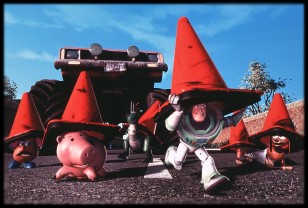 Toy Story 2
Toy Story 2(Disney/Pixar) Barely four years on, the original Toy Story already feels like an American institution. Certainly I've seen it more times than I can count, courtesy Pixar's excellent laserdisc special edition released a few years ago. Miraculously, the sequel seems to have grown organically out of the themes and characterizations established the first time around. It's not necessarily an improvement, but it's not a comedown either. Like the greatest film sequels, it builds on the themes of the original even as it twists them in interesting ways. The sequence in which Buzz Lightyear not only comes face to face with his mass-produced brethren in the aisle of a toy store but also confronts a deluded mirror-image of his character from the first film is the year's coolest metaphysical spectacle not found in Being John Malkovich. Along with The Iron Giant and Babe: Pig in the City, proof positive that kids' movies needn't be condescending -- and, unlike the other two fine films, this one actually made some serious money, so there may yet be hope.
|
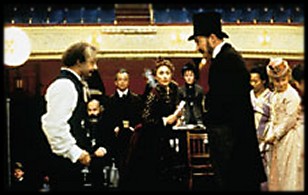 Topsy-Turvy
Topsy-Turvy (USA Films/October Films) Mike Leigh's first costume drama recovers from a sluggish start as the smartest, funniest backstage drama since Shakespeare in Love unfolds. Leigh's version of the artist-in-need-of-inspiration story is more ambitious and sophisticated than last year's Oscar-winner, though perhaps too ambitious and sophisticated. The running time is a problem, as is his tendency to go on various tangents that are never fully explored. Still, it's the rare film that offers so many laughs alongside such a penetrating character study. Jim Broadbent's W.S. Gilbert dominates the narrative, and in typical Leigh fashion, the true pathos of his often comical situation doesn't become apparent until the final reel. Fans of period drama and of exuberant thespianship will not be disappointed -- per usual, the Mike Leigh ensemble gives its all, to dazzling effect. |
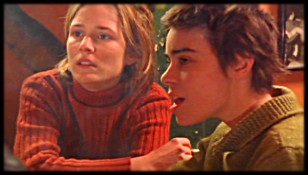 The Dreamlife of Angels
The Dreamlife of Angels(Sony Pictures Classics) I complained about the arbitrarily downbeat ending, but boy does it stick with you. The essence of this film is the fierce performance of Natacha Régnier as Marie, who projects a faux confidence masking the neediness that dooms her, playing against the bright presence of Élodie Bouchez as Isa, the near-penniless tomboy who makes do with what she can scrape together at any given moment. Director Erick Zonca's debut film is disarming, almost hypnotically fascinating, and finally devastating. The video transfer on Columbia TriStar's DVD captures most of the original film's luminosity. |
 Election
Election (Paramount) Underrated by me on first viewing, this high school-based satire of the American political system just gets funnier and more incisive on repeat visits. Matthew Broderick's and Reese Witherspoon's performances are among the year's more underrated, and the team of director Alexander Payne and his co-writer Jim Taylor continue to channel the spirit of Preston Sturges, penning a gently mocking farce that fearlessly (and topically) injects sex into the political landscape. Once again, American Beauty earned the plaudits for studying the sex lives of middle American teenagers and adults, but Election is the smarter, better film. The DVD includes an entertaining commentary by Payne, and is well worth a look. |
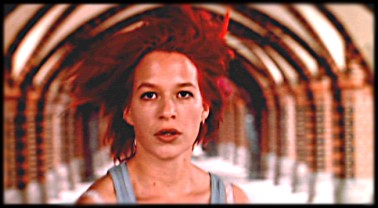 Run Lola Run
Run Lola Run(Sony Pictures Classics) It's useless to resist the intense gravitational pull of Tom Tykwer's hyperkinetic Run Lola Run, which looks even better on video (via an outstanding DVD transfer from Columbia TriStar) than it did in movie theaters. Star Franka Potente, who sprints through the film like a lit match with a shock of red hair and a devil-may-care fashion sense, is the human face of the propulsive techno score and aggressive visual techniques that hold her multiple realities together. I'm still not convinced that it means much, but sometimes meaning is overrated -- like a great pop song, Run Lola Run is a rhythmic paean to the power of True Love. Sometimes, that's all we need. |
|
Guiltless Pleasures: |
